Te Arotahi: Māori-led Policy Papers for Transformative Change
Te Arotahi is Ngā Pae o te Māramatanga’s policy paper series. It shares expert thought and research to inform discussion, policy, and positive action for whānau, hapū, iwi, and wider Māori communities, which benefits all New Zealanders.
The series includes three publication types:
- Arotahi – Substantive research reports focused on a single kaupapa
- Aropū – Short impact briefs summarising key findings and outcomes
- Arowhānui – Evidence syntheses drawing from multiple NPM projects
All papers are freely available and designed to share policy-relevant, Māori-researched solutions.
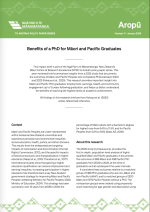
This impact brief is part of the Ngā Pae o te Māramatanga: New Zealand’s Māori Centre of Research Excellence (NPM) Te Arotahi policy paper series. This peer-reviewed brief summarises insights from a 2025 study that documents the outcomes of Māori and Pacific Peoples who completed PhDs between 2003 and 2022 (Kokaua et al., 2025).
Document
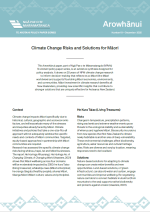
This Arowhānui paper, part of Ngā Pae o te Māramatanga’s (NPM’s) Te Arotahi policy paper series, is an evidence synthesis designed for policy analysts. It draws on 20 years of NPM climate change research to inform decision-making that reflects te ao Māori (the Māori worldview) and supports flourishing Māori economies, environments, and communities. Māori investment in climate research benefits all New Zealanders, providing new scientific insights that contribute to stronger solutions that are uniquely effective for Aotearoa New Zealand.
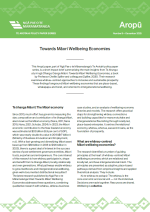
This Aropū paper, part of Ngā Pae o te Māramatanga’s Te Arotahi policy paper series, is a short impact brief summarising the main insights from Te Ahunga atu ki ngā Ōhanga Oranga Māori: Towards Māori Wellbeing Economies, a book by Professor Chellie Spiller and colleagues (Spiller, 2025). Their research examines whānau-centred approaches to inclusive and sustainable prosperity. These findings foreground Māori wellbeing economies that are place-based, whakapapa-anchored, and oriented to intergenerational wellbeing.
Te ōhanga Māori | The Māori economy
Document
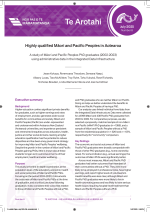
Higher education confers significant private benefits for graduates, such as higher earnings and rates of employment, and also generates wider social benefits for communities and society. Māori and Pacific Peoples (Pacific) are under- represented and underserved within Aotearoa New Zealand (Aotearoa) universities, and experience persistent and entrenched inequities across education, health, justice and other social domains.
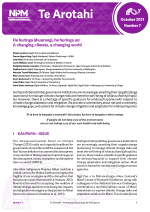
Iwi/hapū (tribe/subtribe) governance institutions are increasingly asserting their rangatiratanga (autonomy) to manage climate change risks and meet the well-being of whānau (family)/hapū/ iwi. However, there is a shortage of specific guidance for whānau/hapū/iwi with respect to climate change adaptation and mitigation. We provide a commentary about risk and uncertainty, knowledge gaps, and options for climate change mitigation and adaptation for whānau/hapū/iwi.
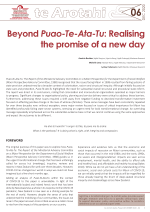
Scholars at Ngā Pae o te Māramatanga call for a 1988 report to be our blueprint for how we begin to restructure our country in the wake of Covid-19.
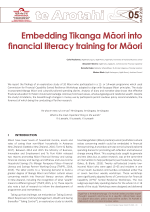
Māori have repeatedly stressed that wealth and well-being is not just about bank balances. Instead for tangata whenua it is defined in terms of the quality of whānau relationships, whanau cohesion, and our children’s capacity to thrive. NPM’s fifth Te Arotahi paper asserts that tikanga Māori values must form a core component of teaching financial management skills to our whānau and communities. As we seek as a nation to ensure prosperity and well-being for all, the unique concepts of wealth that are defined by tikanga need to be valued equally with the practical skills of
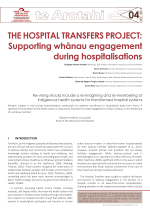
Poipoia te kākano, kia puawai
Nurture the seed and it will blossom
For Māori, as the Indigenous peoples of Aotearoa New Zealand, the care of those who are unwell has always been the concern of whānau (family) and community.
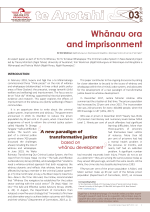
This paper calls on government to pay even closer attention to the issues of whānau and whakapapa within the criminal justice system and advocates for the development of a new paradigm of transformative justice based on whānau development that values tino rangatiratanga and tikanga Māori.
In Whānau Ora and Imprisonment Sir Kim Workman asserts that “If the principle of tino rangatiratanga is fully acknowledged, then the development of a Kaupapa Māori justice system is an achievable outcome.”
Document
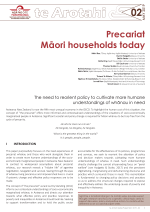
The need to reorient policy to cultivate more humane understandings of whānau in need.
Aotearoa New Zealand is now the fifth most unequal economy in the OECD. To highlight the human cost of this situation, the concept of “the precariat” offers more informed and contextualised understandings of the situations of socio-economically marginalised people in Aotearoa. Significant societal and policy change is required for Māori whānau to be truly free from the cycle of precarity.